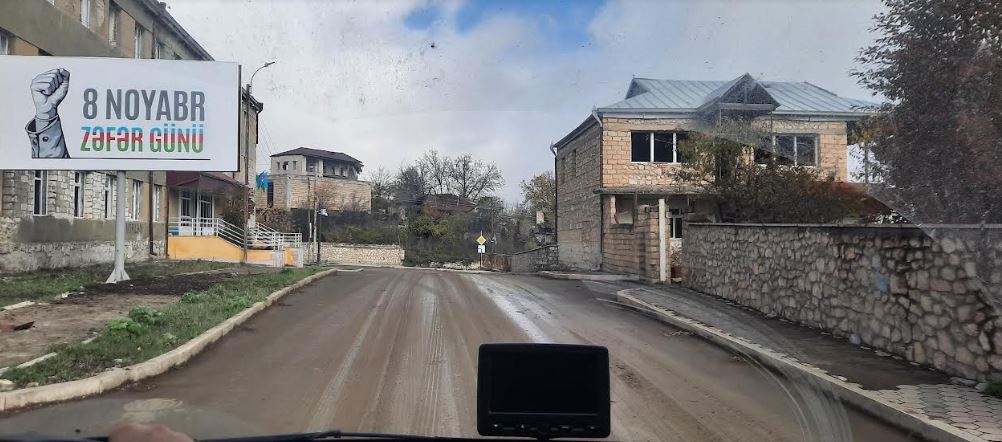Shusha – the fairyland of Azerbaijan (Part-1)

Ansar M Bhatti
Shusha, or Susa, is well known for its cultural as well as tourist attractions. It used to serve as a key tourist resort even in the Soviet era. Situated at an altitude of 1,400–1,800 metres (4,600–5,900 ft) in the Karabakh Mountains, the city has a lot to offer to the visitors. Most sources date Shusha’s establishment to the 1750s by Panah Ali Khan, founder of the Karabakh Khanate, coinciding with the foundation of the fortress of Shusha, attributing this to an alliance between Panah Ali Khan and Shahnazar. Shusha is often considered the cradle of Azerbaijan’s music and poetry, and one of the leading centres of the Azerbaijani culture.
The writer at the gate of the Shusha Fort
During the first war, the Armenian forces occupied the city and destroyed most of the infrastructure. After taking over Shusha, the Armenians had forced the Azerbaijani people to leave the city. A large number of Armenians from mainland Armenia flocked to the place and settled there. So much so that Armenians even forcibly evicted Azeri people from their homes. It was not less than an ordeal for the Azeri people to live a life of subjugation in their own city but after 30 years they have finally re-taken their home as a result of the 44-day Patriotic War.

I had heard and read about the scenic beauty and natural grandeur of Shusha and when I reached there, as part of the Pakistan media delegation, I was simply nonplussed to witness nature at its best. The lush green lofty mountains and thick clouds kissing these mountains presented a spell-binding panorama. We were told the place looks like Murree but it was ostensibly much more attractive and seductive, especially for those who happen to be ardent admirers of nature and scenic beauty. True, beauty lies in the eyes of the beholder, but Shusha by all means in itself is an epitome of beauty.
It took us almost five hours to reach our first destination Fuzuli, another town which was hit hard by the Armenian aggression. Armenians before leaving the place filled it with mines with a view to inflicting losses on the Azerbaijani forces and people; however with the timely and committed efforts of Azerbaijani armed forces and landmines experts, the area has been cleared. During the briefing to the media delegation, a practical demonstration was arranged as to how the landmines worked.
Fuzuli International is an airport in the city of Fuzuli in Azerbaijan. It is one of the country’s seven international airports. The airport is built on an airdrome abandoned for almost 30 years and surrounded by former minefields. It was constructed at a cost of 75 million manats ($44 million). In the late 1980s the town of Fuzuli had some 17,000 residents. During the First Nagorno-Karabakh War, on 24 August 1993, the Azerbaijani Armed Forces were forced to withdraw from Fuzuli. Fuzuli was reduced to a ghost town before its fall in the face of continued pressure from the armed forces of the Republic of Armenia. After witnessing the way Azerbaijani govt is carrying out development work in Fuzuli, one can easily say that after one year the city will have a new look and a lot to offer to the local as well as international visitors.
Our next stop was of course the fairyland Shusha and all of us were excited to reach the place. By the time we left Fuzuli the sun had already set and dark clouds encircled the entire district. The road leading to Shusha was built in a record time. The distance from Fuzuli to Shusha is only 63 kilometers and it took us an hour to reach our first destination in Shusha – a traditional restaurant named Qoc.et recently inaugurated. Extremely tired after a long trip, each one of us enjoyed juicy lamb chops, fresh grilled chicken along with mouth-watering kebabs. Traditional Azerbaijani breads and a collection of seasonal salads was yet another delicacy that made our dinner memorable.
As soon as we left the restaurant for the boarding and lodging facility, light drizzle and dark clouds welcomed us. It was quite a romantic scene and I am sure if poets like William Wordsworth, William Blake, John Keats or PB Shelly were there, they would have exhausted their vocabulary to describe the scene. When it comes to the beauty of the place, I think I should stop here and leave it to the nature lovers to rush to the place and see with their own eyes because seeing is believing!!
to be continued…..
Related News

When Rules Apply Selectively
Dr. Muhammad Akram Zaheer When Canadian Prime Minister Mark Carney addressed the World Economic ForumRead More

The Future of the World
Dr. Muhammad Akram Zaheer The world stands at a difficult crossroads. Economic growth, once takenRead More


Comments are Closed